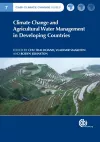
Climate Change and Agricultural Water Management in Developing Countries
3 contributors - Hardback
£57.65
Manzoor Qadir is an environmental scientist working on water-related sustainable development through contribution to policy, institutional and biophysical aspects of unconventional water resources, water recycling and safe reuse, water quality and environmental health, and water and food security under changing climate. Manzoor has led teams of eminent professionals as Coordinating Lead Author to contribute to global assessments, such as the Comprehensive Assessment of Water Management in Agriculture, and the International Assessment of Agricultural Science and Technology for Development. He has implemented multidisciplinary projects on water and land management with major work in the Middle East and North Africa, Central Asia, South Asia, and Sub-Saharan Africa regions. In addition to supervising post-doctoral fellows, postgraduate students, and interns, he has undertaken several international and regional capacity development initiatives such as organizing knowledge bridging workshops and training courses for young researchers. Before joining United Nations University Institute for Water, Environment and Health (UNU-INWEH) in Canada, Manzoor previously held professional positions at the International Center for Agricultural Research in the Dry Areas (ICARDA) and International Water Management Institute (IWMI); Alexander-von-Humboldt Fellow and Visiting Professor at Justus-Liebig University, Germany; and Associate Professor at the University of Agriculture, Pakistan.
Vladimir Smakhtin has over 35 years of experience as a Researcher and Manager in the broad area of water resources. He holds a Ph.D. in hydrology and water resources from the Russian Academy of Sciences. He worked at Rhodes University and Council for Scientific and Industrial Research (CSIR) in South Africa, and as a research program director at IWMI headquartered in Sri Lanka. His experience spreads across agricultural and environmental water management, low-flow and drought analyses, assessment of basin development and climate change impacts on water availability, provision of hydrological information for data-poor regions, water-related disaster risk management. He initiated, managed, or contributed to numerous research initiatives in over 20 countries worldwide, including the state programme for mitigating the consequences of Chernobyl Accident in Russia and Ukraine, development of Ecological Reserve methods in South Africa, a first global analysis of ecosystem water requirements, and several projects focusing on managing water resources variability through enhanced surface and groundwater storage. Vladimir has authored over 200 publications and has consulted for several national governments and international organizations including the Department of Water Affairs of South Africa, Ontario Ministry of Natural Resources, World Commission on Dams, WB, ADB, IUCN and UNEP.
Sasha has nearly 35 years of experience in international assistance and policy development in agriculture water and environment/natural resource management. Currently, she is the Deputy Director and Head of Water at the UN Food & Agriculture Organization (FAO), leading programs on sustainable land and water management and governance, geospatial data, integrated water resources management with linkages to climate, energy, health, and food and nutrition security. She formerly served as Senior Advisor to the leadership at the U.S. EPA, and as Secretariat of the Organisation for Economic Co-operation and Development (OECD), where she directed and managed international environment and water programs, strategized in the development of various sustainable investment mechanisms such as wastewater financing in the GEF Caribbean Wastewater Revolving Fund and the Millennium Challenge Corporation Cabo Verde Compact on sustainable water infrastructure financing. She is now on the Governing Boards of the World Water Council and the CGIAR’s Water Land Ecosystems, and UNEP Global Partnerships on nutrient and wastewater management. She published, sponsored and peer-reviewed extensively on international water issues, such as the UN World Water Development Reports, FAO-WHO Wastewater Reuse Guidelines for Agriculture, FAO reports on Agriculture-Nature Based Solutions, Wealth of Waste: The Economics of Wastewater Reuse, Desalination and Agriculture, Agriculture Water Quality Guidelines for China, and the OECD country Water Governance reviews.
Edeltraud Guenther is an internationally recognized economist and professor of business management. She is currently serving as the Director of the United Nations University Institute for Integrated Management of Material Fluxes and of Resources (UNU-FLORES), based in Dresden, Germany, and has held the position of Chair of Business Management, Sustainability Management and Environmental Accounting, at the Faculty of Business and Economics at Technische Universität Dresden (TU Dresden) since 1996. Additionally, Edeltraud is the founding member and current Chair of the Centre for Performance and Policy Research in Sustainability Measurement and Assessment (PRISMA) and has undertaken visiting professorships at Namibia University of Science and Technology (NUST), Kobe University, and University of Virginia. Edeltraud was also one of the establishing Directors and the first Chair for the UNU Water Network, which was initiated in 2019. In 2020, she was appointed UNU Senior Official for the Environmental Management Group (EMG). Edeltraud’s extensive research covers sustainability management, environmental accounting, and management control systems, with an emphasis on corporate responsibility, life cycle assessment, resilience, and sustainability assessment – particularly the question of ‘how does it pay to be sustainable’?